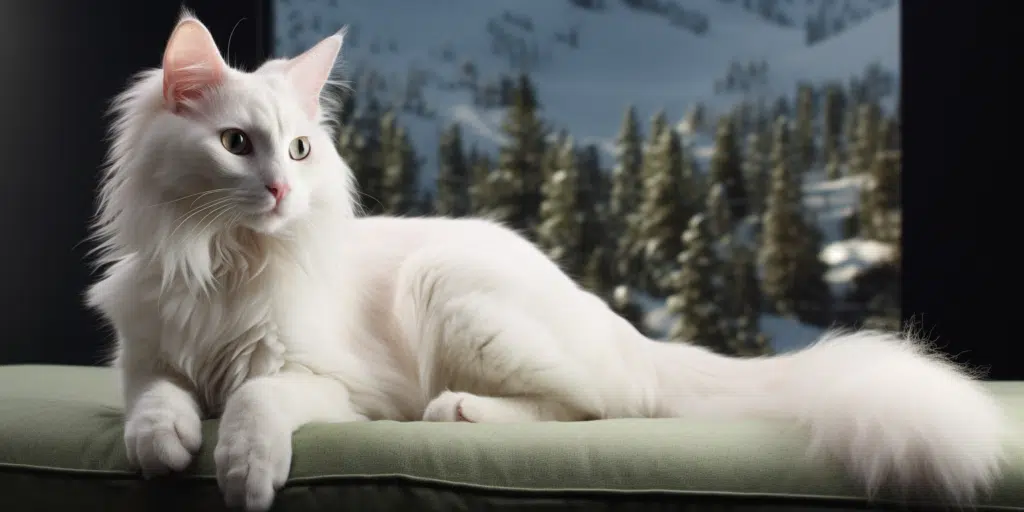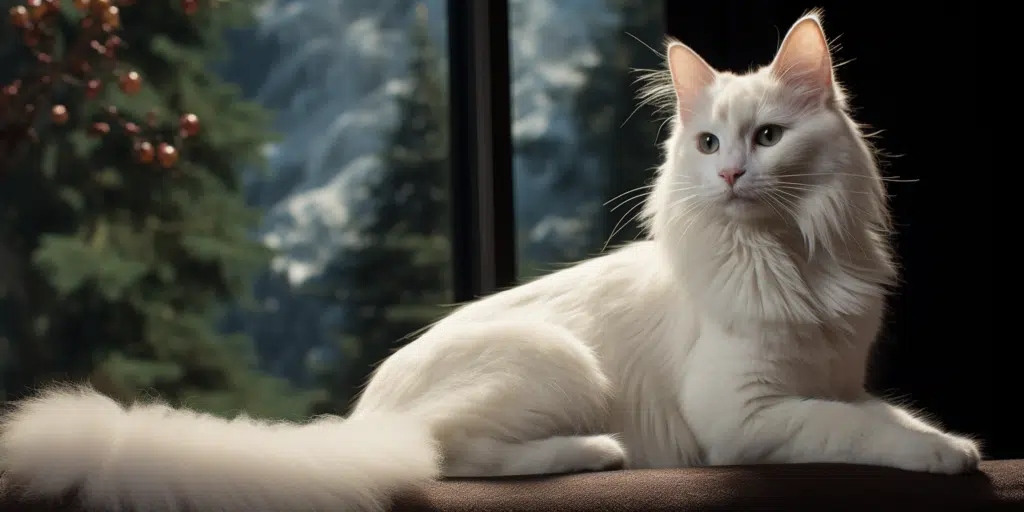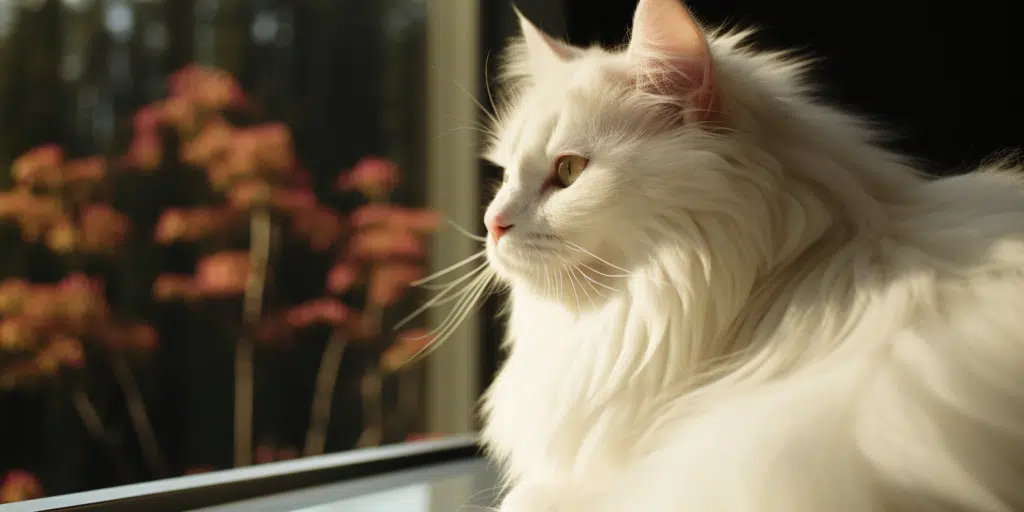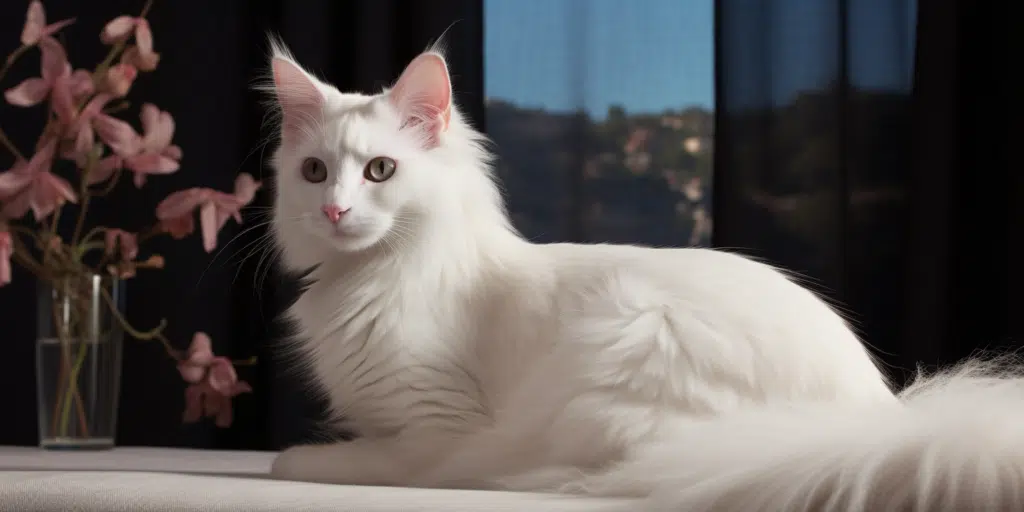The Turkish Angora is a true treasure among cats. One can’t help but be enamored of this lovely breed with its fine-boned elegance, gossamer silk coat, and regal bearing. Not only are they stunning to look at, but they also make wonderful pets due to their affectionate nature and lively demeanor.
These cats are playful and energetic companions who will welcome visitors with enthusiasm and charm them with their graceful moves. It’s no wonder why these cats have been cherished for centuries in their native land!
If you’re lucky enough to own a Turkish Angora cat, you’ll want to ensure that you provide them with the best care possible so that they maintain their beauty and health for years to come.
To provide the best possible care for your Turkish Angora, this article will provide you with all the information you need on diet, health, grooming, and other important topics to ensure your cat enjoys a long and healthy life.
Breed Overview
The Turkish Angora is a naturally occurring breed of long-haired cat that has captivated humans for centuries. Their name comes from the city of Ankara in Turkey, formerly known as Angora.

It’s believed that Vikings may have brought them to Europe from Turkey over 1,000 years ago, and they quickly became a sought-after souvenir for visitors or invaders to the area. The Ankara Zoo started a breeding program to save the cats when they eventually became rare.
By the 17th century, the Turkish Angora had established itself as a separate breed in Europe; nonetheless, Angoras and Persians share a close relationship.
In 1954, Turkish Angoras first entered the United States, where breeders took an interest in them and began breeding programs of their own.
The Cat Fanciers Association (CFA) began registering these cats in 1968 and granted full recognition to white Turkish Angoras in 1972, while colored ones were accepted six years later, in 1978.
The majority of North American cat registries now widely acknowledge these cats as being incredibly stunning. Their long coats are composed of silky fur that can easily rival the finest Angora sweaters!
Their personalities make them even more attractive, however, as they are usually very outgoing with people, which makes them great companions. They also love playing games like fetching small toys or running around chasing a laser pointer—anything to get some attention!
Related: Asian Cat Breeds with Captivating Histories and Origins
Identifying Turkish Angora Breed
Fine-boned and elegant, with a wedge-shaped head, a long silky coat, and a plumed tail, this cat is often described as ballerina-like.
This breed displays a silky, medium-length coat that comes in a variety of colors, including lavender and chocolate. It has no undercoat. Although similar in looks to its cousin, the Turkish Van, the Turkish Angora is smaller in build and lacks the Van’s distinctive markings around the eyes.
The Angora’s almond-shaped eyes can be blue, green, amber, or even odd-eyed (one blue and one amber). A picture of elegance, the Turkish Angora has a slender build, fine-boned legs, and a silky tail plume that resembles a fox tail.

Personality Traits
Turkish Angoras are an affectionate and loyal breed of cat. They are known for their intelligence, athleticism, agility, and clown-like personalities. They enjoy socializing with people and other pets in the home as long as they recognize that the Turkish Angora is the boss.
The Turkish Angora is a friendly, outgoing breed that loves to spend time with its humans and bond with them. They are naturally good-natured, making them an excellent choice for families with children, as they will tolerate being hugged and petted.
If you are a pet lover, you will be happy to know that the Turkish Angora is quite sociable with other animals. With a proper introduction and controlled circumstances, they can get along well with cats and dog breeds that are known to be friendly towards felines. These playful and adventurous cats are also quite easygoing around other pets, making them a great addition to any animal-loving household.
Activity Level
The Turkish Angora is renowned for its exquisite charm and refined nature. However, it’s crucial to not let its graceful appearance fool you. Under its stunning looks lies a remarkably lively feline, brimming with energy and always eager to engage in play. With a physique composed of robust muscles, these cats possess not only beauty but also impressive athleticism.
They have an amazing sense of humor and love to keep themselves entertained with games such as hide-and-seek or fetching toys. As they remain kitten-like even into adulthood, these cats are rarely bored and can often be found daydreaming out the window or romping around the house in pursuit of their favorite toy.
They also excel in agility due to their intelligence and physical strength; they make great competitors in any feline sport!
Turkish Angora Cat Loyalty
The Turkish Angora cat is a sweet and gentle companion, known for its loyalty and affection. This breed of cat is quite intelligent and enjoys learning new things, which can make them great additions to any home.
Angoras are not only known for their loyal personalities, but they also have a playful side that can be quite entertaining! They love playing fetch with toys or chasing each other around the house, which not only keeps them active but also provides amusement for everyone!
The only thing they may not appreciate is sudden changes in their environment; if something unexpected happens, these cats may become upset until they get used to the new situation again.
Despite this trait, Angoras remain loving companions who will give lots of affection when needed most!

Love Of Water
The Turkish Angora is a fascinating breed of cat that simply adores water. They have a knack for effortlessly scaling walls, curtains, and furniture, showcasing their impressive agility and love for heights.
They have been known to splash around in sinks or come running when they hear the sound of the shower. If taken outside, these cats may even paddle in shallow streams and ponds!
As a result, owners of this breed must closely monitor them when they are near any body of water, as their curiosity can lead them into dangerous situations. While they do not require regular access to a bathtub or pool, providing an outlet for their love of water will help keep them safe and entertained!
Trainability
Turkish Angoras are known for their energy and intelligence, making them a great choice for owners who want an active companion. Though they can be demanding of attention, they are also very trainable cats.
With the right amount of patience and consistency, these cats can learn commands like fetching and jumping through hoops as well as more complex tasks such as opening doors or turning on lights with their paws.
Just like any other cat breed, Angora cats will require patience while being trained. They may not respond immediately to commands, but if you remain consistent with their training sessions, then eventually your cat will start responding positively to your instructions.
It is critical that rewards for the right behaviors be given during each session so that your pet understands they have done something correctly, which encourages them to continue learning new things.
Adult Size
The Turkish Angora cat is a medium-sized feline with long and silky fur. They typically weigh between 5-10 pounds, and males are usually larger than females.
The Turkish Angora’s average height ranges from 9 to 14 inches, making them slightly taller than most other cats.
Additionally, they have an average body length of 14 to 18 inches, which makes them longer compared to other breeds in the same size range.
The growth rate of the Turkish Angora at different times in life might vary depending on the individual cat’s genetics, nutrition, and health. In general, kittens grow swiftly during their first few months of life, reaching nearly full size by six months old.
Turkish Angoras reach their full height and continue to fill out until about two years old, when they are fully mature. After that, growth slows drastically, and the cat reaches adulthood around one year old.

Life Expectancy
The Turkish Angora cat is a beautiful and unique breed that has been known to live a very long life. They typically live up to 12–18 years. As with any animal, life expectancy is dependent upon many factors, such as health, diet, living conditions, and genetics.
To ensure your Turkish Angora reaches its maximum lifespan, it is important to provide adequate veterinary care. Regular check-ups with the vet can help prevent any potential illnesses or diseases from arising in the first place.
Turkish Angora Care
Caring for an Angora cat requires dedication and patience. These cats are known for their luxurious coats and remarkable personalities, so it’s important to keep them looking and feeling their best. With the right care, these cats can live long, healthy lives.
Grooming is an essential part of caring for a Turkish Angora cat. Their coat should be combed or brushed weekly to prevent tangles or mats from forming in the fur.
It may take up to two years before their coats reach full length, but regular brushing will help maintain their softness and shine. Additionally, trimming nails every couple of weeks helps ensure that they stay short enough not to snag on anything around the house.
Just as important as grooming for an Angora cat’s general health is dental hygiene, which includes wiping the corners of their eyes with a moist cloth to remove any discharge that may collect over time.
Ideally, you should brush your pet’s fur every day, but even once a week is better than none at all. It is also a good idea to check their ears once a week to remove any debris or dirt that could build up and lead to infection or irritation if not removed.

Maintaining a clean litter box not only makes your four-legged pal feel more at ease, but it also guarantees that his gorgeous coat will remain clean at all times.
It’s always recommended to keep Turkish Angoras indoors; this protects them from diseases spread by other cats as well as potential attacks by dogs or coyotes outside of your home environment.
Keeping your feline safe inside also prevents anyone else from trying to steal him since he’s such an adorable pet!
Diet
The Turkish Angoras is an energetic and active cat that requires a diet rich in high-quality calories to keep up with their daily activities. A balanced, nutrient-dense diet full of real meats without fillers should be the mainstay of a Turkish Angora’s diet.
This can include premium wet foods, kibbles, and raw food diets that mirror the ancestral diet of cats. Turkey angoras have unique nutritional needs due to their high energy requirements for playing and running around.
They need plenty of protein, vitamins, minerals, and essential fatty acids for healthy skin and fur as well as proper brain development and functioning.
Quality proteins should be sourced from fish, poultry, or beef, while carbs should have a low glycemic index to avoid spiking your pet’s blood sugar levels too quickly or too frequently.
Since these cats are highly active, they require slightly more calories than other breeds, so providing enough nutrients without overfeeding them is key!

To keep your cat healthy and hydrated, it is essential to provide plenty of fresh, clean water on a daily basis. The ideal water bowl should be placed at least three feet away from any food to avoid overwhelming the cat’s sensitive nose with food odors.
As cats can easily become bored with their drinking options, it’s also beneficial to provide several different types of bowls throughout the house so your pet has a variety to choose from throughout each day.
To prevent any possible contamination, always change out their drinking bowls twice per week using warm soapy water, followed by rinsing thoroughly with cold running tap water before refilling them completely with fresh water. This ensures they have access to clean drinking sources throughout the day!
Exercise Requirement
Turkish Angora needs plenty of physical and mental stimulation to keep them happy and healthy. Without regular playtime, Turkish Angoras can become bored, anxious, destructive, or overweight.
It is critical to provide young cats with a variety of activities that will excite their curious minds. Interactive toys, such as feather wands or laser pointers, can provide hours of pleasure for your cat while also providing exercise.
Playing fetch with toy mice or balls can be a delightful pastime for both you and your cat. It is also vital to arrange time each day for active play, such as sprinting about the house or playing chase games with other family members or pets.
Providing your pet with adequate amounts of physical activity and mental stimulation will ensure they remain healthy, fit, and content throughout their lifetime, which in turn will strengthen the bond between you two!
Shedding Levels
Turkish Angora cats are famous for their luscious coats of silky fur, which, unfortunately, means they do shed. Like any other breed, they tend to shed more during the spring and fall seasons.
During these times, it is important to brush your Angora regularly to help remove loose fur and prevent mats from forming in their long hair.
Kittens, once past the baby fur phase, tend to shed more until fully grown into adulthood. So they may need extra brushing and grooming throughout the year since shedding can be more intense at this phase.
Generally, to keep up with any excess shedding that occurs, it is important to regularly brush your Turkish Angora’s coat. This will help you take care of your feline friend’s coat, regardless of their stage in life.
Health Issues
Turkish Angora cats are a moderate-shedding breed, and their coats do not match easily. With regular grooming, they can be kept looking show-ready with weekly combing and occasional bathing every couple of months for white or light-colored Angoras.
The most common diseases that Turkish Angoras are prone to include:
- skin allergies
- hip dysplasia
- urinary tract infections (UTIs)
- heart disease
- progressive retinal atrophy (PRA)
Other potential medical issues include flea allergies and ear mites.

Diet and living conditions play a crucial role in your cat’s health. A subpar diet that lacks essential nutrients can result in a range of health problems, including skin issues, joint discomfort, weight gain, dental complications, and a weakened immune system.
It is worth noting that poor living conditions can lead to stress, which in turn can cause digestive issues or more serious illnesses such as upper respiratory infections. To prevent these diseases, it is essential to provide your cat with proper nutrition through high-quality wet or dry food that is suitable for their specific life stage.
In order to maintain good hygiene and reduce the risk of infection, it is important to regularly clean and change the litter boxes for your cats. Another crucial aspect of keeping your cats healthy is ensuring they get enough exercise on a daily basis. This will help them burn off excess calories and prevent illnesses related to obesity.
Buying Tips
- Look for a kitten from a reputable breeder who can provide health records and genetic testing of the parents. Ask if the cat has been tested for potential health issues such as HCM (feline hypertrophic cardiomyopathy) or PKD (polycystic kidney disease).
- Turkish Angoras are known to be active, intelligent, and loyal companions. Make sure you meet with your prospective kitten before making your purchase so that you can assess its personality and determine whether it is a good fit for your lifestyle.
- Turkish Angoras require extensive grooming due to their long fur coats; make sure you are prepared to commit to regular brushing sessions to prevent matting and ensure optimal coat condition.
- In addition to the cost of purchasing the kitten itself, there will also be costs associated with spaying or neutering, vaccinations, routine vet checkups, food and litter supplies, toys and accessories, etc., so make sure you have considered these expenses when deciding whether or not this breed is right for you financially speaking.
You Will Need: 250+ Amazing Turkish Angora Cat Names & How To Select One!

Conclusion
The Turkish Angora cat is an intelligent and loving pet that can make a wonderful addition to any home. They are very active and enjoy playing with their owners, as well as being independent and self-sufficient.
Their unique coat colors and patterns also make them stand out from other cats. With proper care, socialization, exercise, nutrition, grooming, and affectionate interaction with you as their owner, the Turkish Angora will be a loyal companion for many years to come.
If you are looking for an engaging pet to bring lots of joy into your life then consider adopting one of these beautiful cats!